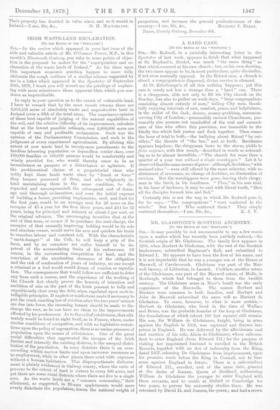A HARD CASE.
Ere THE EDITOR OF THE "SPECTATOR.] Rodwell, in a painfully interesting letter in the Spectator of last week, appears to think that what happened at St. Rapha,el's, Bristol, was much "the HMO thing" as that which occurred at his own church ; but, on his own showing, the two cases appear to be, in most particulars, quite dissimilar, if not oven mutually opposed. In the Bristol case, a church is closed, a congregation is dispersed, divine service is silenced.
At St. Ethelburga's, of all this nothing happens ; yet this case is surely not less a strange than a " hard " one. There is a clergyman, able not only to fill his City church on the Sunday, but also to gather on week-days, "large congregations consisting almost entirely of men," toiling City men, thank- fully enjoying intervals of rest, comfort, peace, and helpfulness, in the midst of the dark, dreary, money-grubbing, mammon- serving City of London,—presumably earnest Churchmen, pre- sumably also persons not unmindful of the zeal and earnest- ness of him who offers this provision, nor insensible to the kindly ties which link pastor and flock together. Then comes the hour of trial to both,—the bullying about Ritual "by out- siders," the threats of "the law," and so forth. Resistance appears hopeless ; the clergyman bows to the storm, yields to force Imajewre, with this result,—described in words so astound- ing as to be almost incredible,—" The church for more than a quarter of a year was without a single worshipper." Let it be observed that the same means of grace—although, doubtless," with maimed rites "—were still offered by the same minister, with no abatement of reverence, no change of doctrine, no diminution of services. But the worshippers were gone, leaving their clergy- man in the lurch, in his loneliness. "Then," in his sore trial, in his hour of darkness, it may be said with literal truth, "then all the disciples forsook him and fled."
Certainly this is not the way in which Mr. Rodwell puts it, for he says,—" The congregations" "were scattered to the winds." But how F Who scattered them ? They simply scattered themselves.—I am, Sir, &c., K. J. Y.






































 Previous page
Previous page